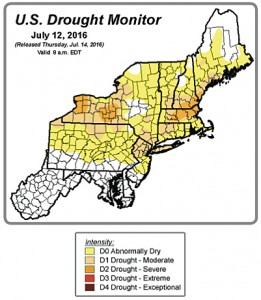We’ve got a new job opening in the NYS IPM Program for a NEWA Coordinator, Extension Associate! The New York State Integrated Pest Management Program (NYSIPM) is a nationally recognized leader in the development and promotion of IPM practices. The NEWA Coordinator will facilitate and guide the Network for Environment and Weather Applications (NEWA) http://newa.cornell.edu/, its operation and development across agricultural commodity areas, and collaborate with NYSIPM staff, the Northeast Regional Climate Center (NRCC), and other Cornell University faculty and Cornell Cooperative Extension specialists to maintain, expand, and improve NEWA. S/he will facilitate and lead statewide and regional demonstration, implementation, and research activities of NEWA and promote is use in IPM decision making.
Responsibilities include:
- Coordinate the development of NEWA tools with faculty and researchers.
- Coordinate implementation of tools and applications that use weather data for IPM and crop management.
- Develop and coordinate state NEWA expansion networks and individual partners in non-member states.
- Interact with NRCC programmers to create NEWA tools.
- Provide leadership for planning, implementing and evaluating NEWA educational programs that address producer and IPM practitioner-identified needs and opportunities.
- Lead and cooperate on NEWA grant and funding proposals with agencies, organizations, faculty and extension personnel, that will address IPM applied research needs and generate program support to enhance and extend program opportunities.
- Plan and execute NEWA demonstrations, workshops and webinars.
- Develop educational materials in support of NEWA, such as manuals, fact sheets, videos, websites, decision support tools, mobile applications, etc.
- Facilitate adoption of NEWA tools.
- Provide technical guidance and educational support on NEWA for extension off-campus staff, especially Area IPM Extension Educators whose audiences may benefit from NEWA tools.
- Work cooperatively with Agricultural IPM program staff in the development of applications.
- Work cooperatively with Community IPM program staff in the development of applications, particularly as needs may overlap in the landscape and turf management arenas.
Key Knowledge, Skills, and Abilities Required to Perform the Work of This Position
- Knowledge of the philosophy and practice of IPM.
- Knowledge of the philosophy, objectives and operation of an informal education system such as Cornell Cooperative Extension.
- Ability to initiate, plan, conduct and evaluate informal adult education programs.
- Ability to define, conduct and interpret applied research and demonstration projects.
- Ability to communicate effectively: verbally, written, and multi-media.
- Ability to communicate effectively with programmers.
- Ability to lead and participate in teams.
Education – MS (required) or PhD (preferred) degree in Entomology, Plant Pathology, Weed Science, Horticulture, Environmental Science or Atmospheric Science.
Experience – Minimum of 2 years professional experience in Extension education and/or research in IPM. Graduate student experience may be applicable.
Application, Submit by August 31, 2016: Curriculum vitae, letter of interest, names and contact information for three references, and a one page statement about your philosophy of IPM and effective ways of promoting and evaluating IPM implementation. Apply at https://academicjobsonline.org/ajo/Cornell/NYSIPM.
Start Date: October 1, 2016, or when a suitable candidate is identified.
Location: New York State Agricultural Experiment Station, Geneva, New York.
For further information see the NYSIPM website, http://nysipm.cornell.edu/, or contact Juliet Carroll, Fruit IPM Coordinator and NEWA Leader, NYS IPM Program, jec3@cornell.edu; 315-787-2430
More jobs in IPM!! — The NYS IPM Program is Hiring Three other Positions
The New York State Integrated Pest Management program (NYSIPM) at Cornell University is hiring four specialists to promote the adoption of IPM in New York State. All positions will be housed on either the Geneva or Ithaca campuses of Cornell University. The positions are:
- Biocontrol Specialist
- Alternative Weed Management Specialist
- Coordinator for Livestock and Field Crops IPM
- Coordinator for the Network for Environment & Weather Applications (described above)
NYSIPM is a nationally recognized leader in the development and promotion of IPM practices. http://nysipm.cornell.edu/. The mission of NYSIPM is to develop sustainable ways to manage disease, insect, weed, and wildlife pests; and to help people use methods that minimize environmental, health, and economic risks. NYS IPM has both Agricultural and Community programs, with issues and settings that overlap. NYSIPM’s Agricultural IPM programming includes fruits, vegetables, ornamentals, and livestock and field crops. Community IPM is the management of insects, weeds, plant diseases and wildlife in all settings that are non-production such as schools, lawns, gardens, landscapes, golf courses, parks, and buildings; and also includes invasive species and public health pests.
The personnel of NYS IPM operate in a collegial and cooperative environment where teamwork is emphasized and appreciated. Collaboration with other NYS IPM faculty and staff, Cornell University faculty and staff, and Cornell Cooperative Extension Educators, as well as specialists from other states and universities, is expected.
Education and Experience – All applicants must have an MS (required) or PhD (preferred) degree in Entomology, Plant Pathology, Horticulture or other suitable field. A minimum of 2 years professional experience in extension education and research or demonstration in required for Extension Associates, 8 years for a Senior Extension Associate. Experience in these areas as a graduate student may apply.
Additional Information AND HOW TO APPLY – For additional information and application instructions go to https://academicjobsonline.org/ajo/Cornell/NYSIPM. Applications will be accepted until 8/31/2016, or until a suitable candidate is found.
